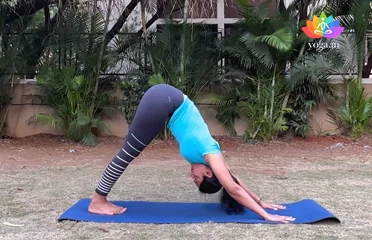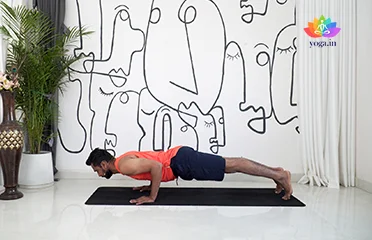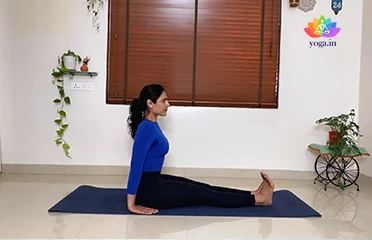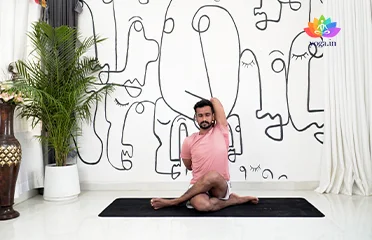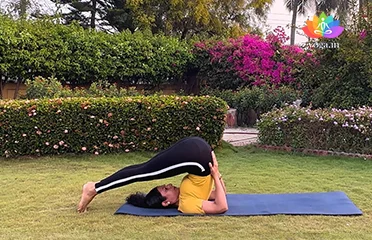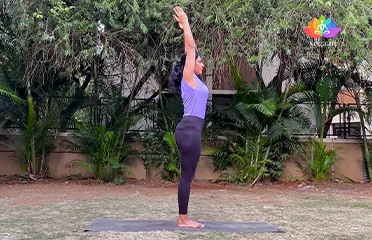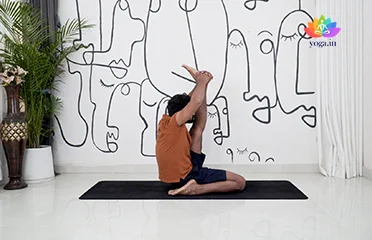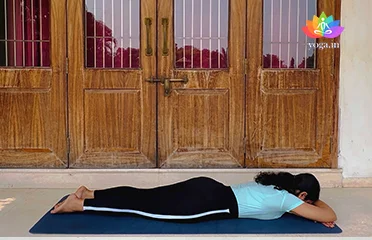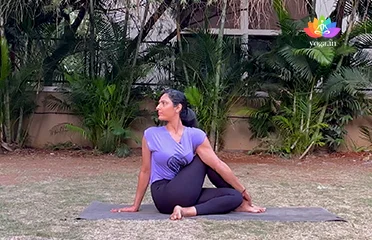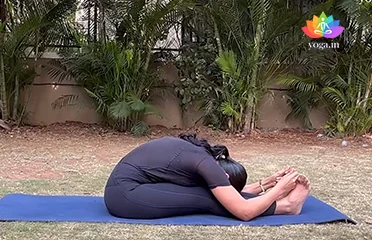Adho Mukha Svanasana (Downward-Facing Do
अधोमुख श्वानासन / Downward-Facing Dog Pose
The sanskrit name is derived from adhas (अधस्) meaning down, mukha [�K]
Chaturanga Dandasana (Low Plank Pose)
चतुरङ्ग दण्डासन / Low Plank Pose
The Sanskrit name is derived from Chatur (चतुर) meaning four, Anga (अङ्ग) [�K]
Dandasana (Stick Pose)
दण्डासन / Stick Pose
The Sanskrit name is derived from Danda (दण्डा) meaning stick and [�K]
Gomukhasana (Cow Face Pose)
गोमुखासन / Cow Face Pose
The Sanskrit name is derived from Gau (गो) meaning cow, Mukh meaning face [�K]
Halasana (Plough Pose)
हलासन / Plough Pose
The Sanskrit name is derived from Hala (हला) meaning plough and asana [�K]
Hastapadasana (Hand to Foot Pose)
हस्तपदासन / Hand to Foot Pose
The sanskrit name is derived from hasta (हस्त) means hands, pada (पदा) [�K]
Kraunchasana (Heron Pose)
क्रौञ्चासन / Heron Pose
The Sanskrit name is derived from Kraunch (क्रौञ्च) meaning heron [�K]
Makarasana (Crocodile Pose)
मकरासन / Crocodile Pose
The Sanskrit name is derived from Makara (मकरा) meaning crocodile and [�K]
Matsyendrasana (Lord of the Fishes Pose)
मत्स्येन्द्रासन / Lord of the Fishes Pose
The name Matsyendrasana is derived from the Sanskrit words Matsya (मत्स्य) [�K]
Paschimottanasana (Seated Forward Bend)
पश्चिमोत्तानासन / Seated Forward Bend
The Sanskrit name is derived from three sanskrit words: Paschima (पश्चिमा) [�K]
- 1
- 2
How Yoga Can Help Cure Fatigue:
Fatigue is a prevalent condition characterized by persistent feelings of tiredness, lack of energy, and exhaustion. Yoga serves as a holistic approach to alleviate fatigue by promoting relaxation, reducing stress, and enhancing overall well-being. Through gentle physical movements, controlled breathing, and mindfulness practices, yoga offers a comprehensive solution for managing and overcoming fatigue.
Understanding Fatigue:
Fatigue refers to a state of extreme tiredness, both physically and mentally, that persists despite adequate rest. It can stem from various factors such as overexertion, stress, poor sleep quality, or underlying health conditions. Fatigue can significantly impact daily functioning, making it challenging to perform tasks and engage in activities with enthusiasm.
Yoga’s Role in Relieving Fatigue:
Yoga offers a multitude of practices specifically designed to combat fatigue and restore vitality. Gentle yoga postures help release tension from the body, improve blood circulation, and increase energy levels. Breathing techniques, such as deep belly breathing and alternate nostril breathing, enhance oxygenation, reduce stress, and promote mental clarity. Additionally, meditation and mindfulness practices foster relaxation, soothe the nervous system, and replenish depleted energy reserves.
Key Factors Contributing to Fatigue:
Several factors can contribute to the onset of fatigue, including:
- Sleep Deprivation: Inadequate or poor-quality sleep disrupts the body’s natural rejuvenation process, leading to fatigue.
- Stress and Anxiety: Chronic stress triggers the release of cortisol, a stress hormone, which can deplete energy levels over time.
- Nutritional Deficiencies: Poor diet lacking essential nutrients can result in decreased energy production and increased fatigue.
- Sedentary Lifestyle: Lack of physical activity can weaken muscles, impair circulation, and contribute to feelings of lethargy.
- Underlying Health Conditions: Conditions such as anemia, thyroid disorders, or chronic fatigue syndrome can manifest as persistent fatigue.
Symptoms of Fatigue:
Common symptoms associated with fatigue include:
- Persistent Tiredness: Feeling constantly exhausted despite adequate rest.
- Lack of Motivation: Reduced interest or enthusiasm for activities.
- Physical Weakness: Muscles feeling heavy or weak, making daily tasks challenging.
- Difficulty Concentrating: Inability to focus or maintain attention for extended periods.
- Irritability: Heightened sensitivity, mood swings, or irritability.
- Impaired Memory: Forgetfulness or difficulty recalling information.
- Headaches: Frequent headaches or migraines may accompany fatigue.
- Decreased Immunity: Increased susceptibility to illness due to weakened immune function.
Treatment of Fatigue through Yoga and Pranayama:
Yoga offers effective techniques to combat fatigue and restore vitality. Some beneficial practices include:
Specific Yoga Poses:
- Supta Baddha Konasana (Reclining Bound Angle Pose): Opens the chest, relaxes the body, and relieves fatigue.
- Viparita Karani (Legs-Up-the-Wall Pose): Improves circulation, reduces swelling in the legs, and rejuvenates the body.
- Surya Namaskar (Sun Salutation): A dynamic sequence that stimulates the entire body, increases blood flow, and boosts energy levels.
Pranayama Exercises:
- Ujjayi Pranayama (Victorious Breath): Deep, rhythmic breathing technique that calms the mind, reduces stress, and increases oxygenation.
- Kapalabhati Pranayama (Skull-Shining Breath): Invigorating breathing exercise that increases alertness, clears the mind, and boosts energy levels.
Diet for Fatigue:
Incorporating a balanced diet can complement yoga practices and enhance energy levels. Dietary recommendations for combating fatigue include:
- Hydration: Drink plenty of water throughout the day to stay hydrated and maintain optimal bodily functions.
- Nutrient-Dense Foods: Consume a variety of fruits, vegetables, whole grains, lean proteins, and healthy fats to provide sustained energy.
- Iron-Rich Foods: Incorporate iron-rich foods such as leafy greens, legumes, nuts, seeds, and lean meats to prevent anemia-related fatigue.
- Complex Carbohydrates: Choose complex carbohydrates like quinoa, brown rice, oats, and sweet potatoes to provide steady energy release.
- Limit Stimulants: Reduce intake of caffeine, sugar, and processed foods, as they can lead to energy crashes and exacerbate fatigue.
Caution for Fatigue:
While practicing yoga for fatigue relief, it’s essential to:
- Listen to Your Body: Honor your body’s limitations and avoid pushing yourself beyond your capabilities.
- Rest When Needed: Incorporate restorative practices and allow sufficient time for recovery between sessions.
- Modify Poses: Adapt yoga poses to suit your individual needs and avoid strain or injury.
- Consult a Healthcare Professional: Seek guidance from a healthcare provider, especially if you have underlying health conditions or concerns about your energy levels.
Contraindications for Fatigue:
Individuals experiencing severe fatigue or chronic exhaustion should:
- Avoid Overexertion: Refrain from intense or strenuous yoga practices that may exacerbate fatigue.
- Choose Gentle Yoga: Opt for gentle, restorative yoga styles that focus on relaxation and rejuvenation.
- Prioritize Rest: Prioritize adequate rest and recovery to allow the body to replenish energy reserves.
- Seek Professional Support: Consult with a yoga instructor or healthcare provider for personalized recommendations tailored to your energy levels and needs.


